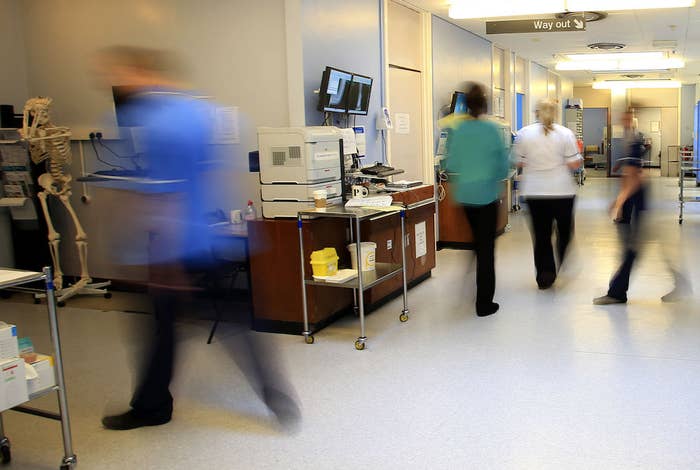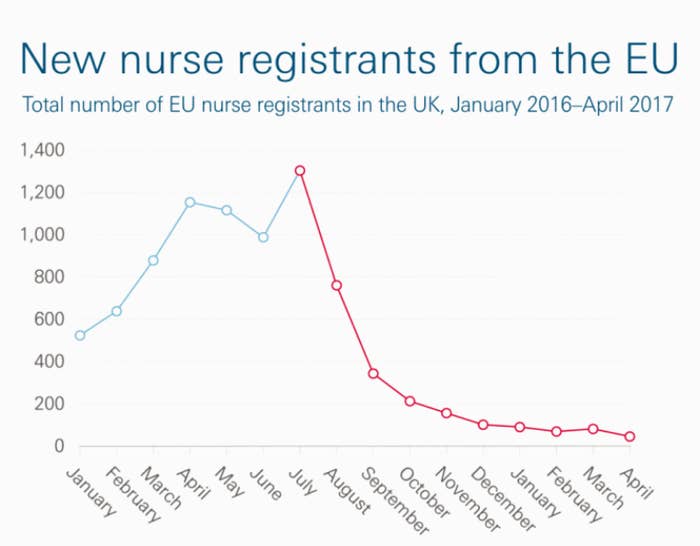
The number of nurses from the EU applying to work in the UK has fallen by 96% since the EU referendum, adding to an already critical staffing shortage, according to an independent health charity.
A Freedom of Information Act request from the Health Foundation to the Nursing and Midwifery Council (NMC), which regulates the profession, found that while 1,304 nurses applied to work in the UK in July 2016, the month after the referendum, this figure had fallen to 344 by September 2016.
And by April this year the figure had plunged to just 46, highlighting the challenge NHS leaders face to ensure its workforce can cope with the increased demands of an ageing population.
Nurses from the EU have made up the majority of the international nurses who came to the UK in the last 10 years, but despite the high numbers of foreign workers there is still a shortage of 30,000 nurses in England alone, the Health Foundation warns.
Both Labour and the Liberal Democrats have said the figures show why the government should guarantee EU workers in the UK permanent residence regardless of the outcome of Brexit negotiations, which are due to begin next week.


"The drop in EU nurses registering to work in the UK could not be more stark – just 46 registered to work in the UK in April," said Anita Charlesworth, the foundation's director of research and economics.
"Without EU nurses it will be even harder for the NHS and other employers to find the staff they need to provide safe patient care. The findings should be a wake-up call to politicians and health service leaders."
Charlesworth added that the shortage of nurses was not caused by Brexit: "Clearly action is needed to offset any further loss of EU nursing staff in the near future.
"But the overall shortage of 30,000 nurses is not a shortage caused by the Brexit vote. The chronic shortage of nurses is the result of years of short-term planning and cuts to training places. A sustainable, long-term approach to workforce planning is desperately needed."
A pre-election briefing by the foundation said that the absence of a national recruitment strategy for the next 10 to 15 years was the biggest threat to the sustainability of the NHS, with Brexit set to increase the risk.
Janet Davies, the CEO of the Royal College of Nursing, said: "We rely on the contributions of EU staff and this drop in numbers could have severe consequences for patients and their families.
"Our nursing workforce is in a state of crisis, with more than 40,000 vacancies in England alone. Across our health service, from A&E to elderly care, this puts patients at serious risk."
Labour's shadow health secretary Jon Ashworth said: "The truth is that Theresa May has tried to use NHS staff as bargaining chips in her negotiations with Brussels. The NHS should be a priority in the Brexit negotiations and the government should immediately guarantee the rights of EU staff who are working here in our health and care services."
Norman Lamb, the Liberal Democrat health spokesman, said: "These figures are profoundly worrying and the possible implications for the NHS and patients cannot be underestimated.
"The government has to face up to the impact their refusal to guarantee EU citizens to remain in the UK after Brexit is having. It is a political choice they have made and it is going to harm our services, in particular the NHS. The government must now change this decision. The result of the election last week gives them the opportunity to change their mind, and they now must."
FOI requests from the Liberal Democrats to 80 NHS trusts in March found that 2,700 nurses who are EU nationals left the NHS in 2016, compared to 1,600 in 2014.
A spokesperson for the Department of Health said in an emailed statement: "Nationals working in our health and care system should be a priority in Brexit negotiations. We also have over 52,000 nurses in training to ensure the NHS has the nurses it needs."
The government added that the reduction is partly due to the introduction of more rigorous language testing and pointed out that a similar reduction happened after changes to language tests for doctors.
Jackie Smith, CEO and registrar of the NMC said: "Earlier this year we released figures which showed the number of EU trained nurses and midwives joining our register was reducing. At the same time, figures also showed the number of EU trained nurses and midwives leaving our register was increasing.
“Latest figures for April and May 2017 show that these trends have continued, however, it is still too early to say definitively that this is due to any one reason. It is more likely that a combination of factors are at play including the recent introduction of English language controls and the uncertainty about the effect of Brexit on individual nurses."A spokesperson for NHS England said it could not comment on Brexit-related matters.
